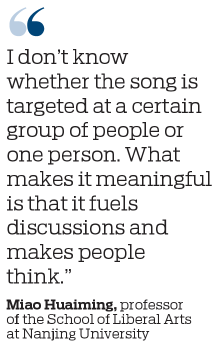Chinese pop artist's 'revenge' song goes viral, triggers debates

Few people expected that a new song written and performed by Chinese pop singer-songwriter Daolang, who kept himself out of the limelight for years, would go viral on social media.
However, the track Luocha Haishi (A Market in a Faraway Land) — one of the 11 original songs from the 52-year-old artist's latest album titled Shan Ge Liao Zai (Folk Songs Fading Away) — has topped the charts on several Chinese music apps and has become one of the biggest hits of the year so far.
The song, which was released on July 19, garnered 8 billion streams by 6 pm on July 30, according to Tide News, a news app affiliated with Zhejiang Daily Press Group.
Some people have volunteered to translate the song into other languages and adapt it into other art forms including traditional Chinese opera.
The curiosity surrounding the song seems to be driving its popularity. Social media users are furiously debating if the lyrics have hidden meanings.
Reading between the lines, some online listeners said the song is a stinging satire on the current "unhealthy and chaotic environment in show business" in China, while others see Luocha Haishi as Daolang's "revenge" on people who once despised his music.
According to the album's introduction, Shan Ge Liao Zai is a mix of Liaozhai Zhiyi, or Strange Stories From a Chinese Studio, which is a collection of ghost stories by Qing Dynasty (1644-1911) writer Pu Songling, and Chinese folk songs of different regions.
"Shan Ge Liao Zai is Daolang's attempt to explore popular Chinese folk music and folk tales after his 2020 album, The Book of Plucking Rhymes, which highlighted the folk music of regions on the southern banks of the Yangtze River," it said.
The lyrics of Luocha Haishi is adapted from a Liaozhai Zhiyi tale by the same name, which talks about a man's adventure in a faraway kingdom called Luocha. The people of this imaginary land regard ugliness as beauty, call black white and confuse between right and wrong.
The music is based on Tianjin Shidiao, a unique music genre in Tianjin that originated under the Ming Dynasty (1368-1644).
"I am impressed that Daolang adapted (into a song) a tale from the Liaozhai Zhiyi. It's so cool to write songs to express sarcasm without using any nasty words," a fan wrote on Sina Weibo.
Another user said: "The song portrays a music industry where people tend to like the same songs. Music companies try to churn out hits just to make money, and the music is boring as a result."
In an interview with Yangzi Evening News on July 28, Miao Huaiming, a professor at Nanjing University's School of Liberal Arts, said that Daolang uses Luocha, the kingdom in folk tale, as a metaphor for the music industry.
"As a researcher on classic Chinese literature, I support Daolang, whose new song is creative and gives Liaozhai Zhiyi a new interpretation. I don't know whether the song is targeted at a certain group of people or one person. What makes it meaningful is that it fuels discussions and makes people think," Miao said.
Born as Luo Lin in Neijiang, Sichuan province, Daolang moved to the Xinjiang Uygur autonomous region in the 1990s and founded his music studio. He was deeply influenced by Chinese folk music, especially the music of various ethnic groups.
In 2004, he rose to fame with an album called The First Snowfall in 2002. Though the album and the title song won many awards in China and the album sold millions of copies, some critics scoffed at Daolang's music.
Chinese singer Na Ying once said Daolang's songs "lacked aesthetics", and in 2010, she refused to select him as one of the "Top 10 Influential Chinese Singers".
Daolang's agent recently told a news platform, Ding Duan News, managed by Henan Daily, that the singer will not do any interviews or comment on any interpretations of his latest hit.
Hong Qi, a singer-songwriter and Daolang's friend, said in an interview that Daolang loves traditional Chinese culture and folk music, and so it was very natural for the experienced musician to choose the theme that he did. "Any other interpretation comes from people's own imagination," Hong said.
On August 2, rock musician Wang Feng, who some believe is the target of ridicule in the song, responded to online comments by saying that he "never looked down upon people who are true to their music".
In a 20-minute video posted on Wang's Weibo account, the singer-songwriter talked about Daolang's new album, praising his mastery of combining Chinese and Western musical styles and instruments, and balancing melody and lyrics to express himself.
"Music is about music itself. It is not about right and wrong; it is not an ethical trial," Wang said in the video.
chennan@chinadaily.com.cn






















